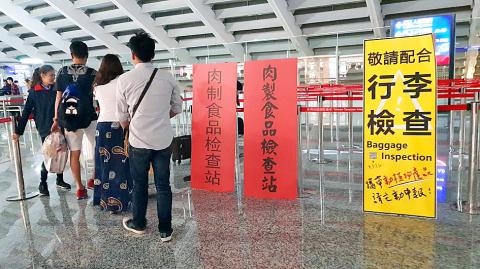With South Korea confirming an outbreak of African swine fever, the Council of Agriculture (COA) yesterday said that travelers caught bringing in pork products from that country would be fined a minimum of NT$200,000 (US$6,444).
Taiwan has been striving to keep the deadly swine disease at bay since China reported the first outbreak in August last year and the disease has continued to sweep across Asia.
The fine was put in place at 1pm yesterday after South Korean Minister of Agriculture Kim Hyun-soo said that the nation’s first case of the highly contagious disease was confirmed yesterday in tests on five pigs that died on Monday evening at a farm in Paju, a town near the border with North Korea.

Photo: Chien Hui-ju, Taipei Times
After North Korea reported an outbreak in late May, South Korea was included in the council’s list of countries with a higher risk of transmitting the disease, it said.
The carry-on luggage of tourists returning from high-risk countries have to undergo X-ray scans at customs, it said.
In addition to countries that have reported an outbreak of African swine fever — China (including Hong Kong and Macau), Mongolia, Vietnam, Cambodia, North Korea, Laos, Myanmar, the Philippines, South Korea and Russia — the council added Malaysia, Singapore, Indonesia and Brunei to its high-risk list earlier this month, even though they have not reported any infection cases.
Those caught attempting to bring pork products from countries that have reported an epidemic are to be fined NT$200,000 for a first-time offense and NT$1 million for repeat offenses, the council said.
Foreign tourists who fail to pay the fine for illegal pork imports at customs would be denied entry into Taiwan, it added.
As of Sunday, the government had issued 534 tickets of NT$200,000 each for travelers found carrying banned pork products, including 298 to Chinese tourists and 170 to Taiwanese travelers.
Of the 534 tickets, 491 were for attempting to bring in pork products from China, 42 from Vietnam and one from the Philippines.
The South Korean agriculture ministry later yesterday said it was also looking into a suspected second case from a farm in the nearby town of Yeoncheon, where the owner reported the death of a pig, and that test results were expected today.
Officials were yesterday planning to complete the culling of about 4,000 pigs raised at the Paju farm and two other farms run by the same family.
Seoul also strengthened efforts to disinfect farms and transport vehicles, and ordered a 48-hour standstill on all pig farms, slaughterhouses and feed factories across the nation to prevent the spread of the disease, which threatens a massive industry that involves 6,000 farms raising more than 11 million pigs.
Additional reporting by AP

AGING: As of last month, people aged 65 or older accounted for 20.06 percent of the total population and the number of couples who got married fell by 18,685 from 2024 Taiwan has surpassed South Korea as the country least willing to have children, with an annual crude birthrate of 4.62 per 1,000 people, Ministry of the Interior data showed yesterday. The nation was previously ranked the second-lowest country in terms of total fertility rate, or the average number of children a woman has in her lifetime. However, South Korea’s fertility rate began to recover from 2023, with total fertility rate rising from 0.72 and estimated to reach 0.82 to 0.85 by last year, and the crude birthrate projected at 6.7 per 1,000 people. Japan’s crude birthrate was projected to fall below six,

US President Donald Trump in an interview with the New York Times published on Thursday said that “it’s up to” Chinese President Xi Jinping (習近平) what China does on Taiwan, but that he would be “very unhappy” with a change in the “status quo.” “He [Xi] considers it to be a part of China, and that’s up to him what he’s going to be doing, but I’ve expressed to him that I would be very unhappy if he did that, and I don’t think he’ll do that. I hope he doesn’t do that,” Trump said. Trump made the comments in the context

SELF-DEFENSE: Tokyo has accelerated its spending goal and its defense minister said the nation needs to discuss whether it should develop nuclear-powered submarines China is ramping up objections to what it sees as Japan’s desire to acquire nuclear weapons, despite Tokyo’s longstanding renunciation of such arms, deepening another fissure in the two neighbors’ increasingly tense ties. In what appears to be a concerted effort, China’s foreign and defense ministries issued statements on Thursday condemning alleged remilitarism efforts by Tokyo. The remarks came as two of the country’s top think tanks jointly issued a 29-page report framing actions by “right-wing forces” in Japan as posing a “serious threat” to world peace. While that report did not define “right-wing forces,” the Chinese Ministry of Foreign Affairs was

PREPAREDNESS: Given the difficulty of importing ammunition during wartime, the Ministry of National Defense said it would prioritize ‘coproduction’ partnerships A newly formed unit of the Marine Corps tasked with land-based security operations has recently replaced its aging, domestically produced rifles with more advanced, US-made M4A1 rifles, a source said yesterday. The unnamed source familiar with the matter said the First Security Battalion of the Marine Corps’ Air Defense and Base Guard Group has replaced its older T65K2 rifles, which have been in service since the late 1980s, with the newly received M4A1s. The source did not say exactly when the upgrade took place or how many M4A1s were issued to the battalion. The confirmation came after Chinese-language media reported